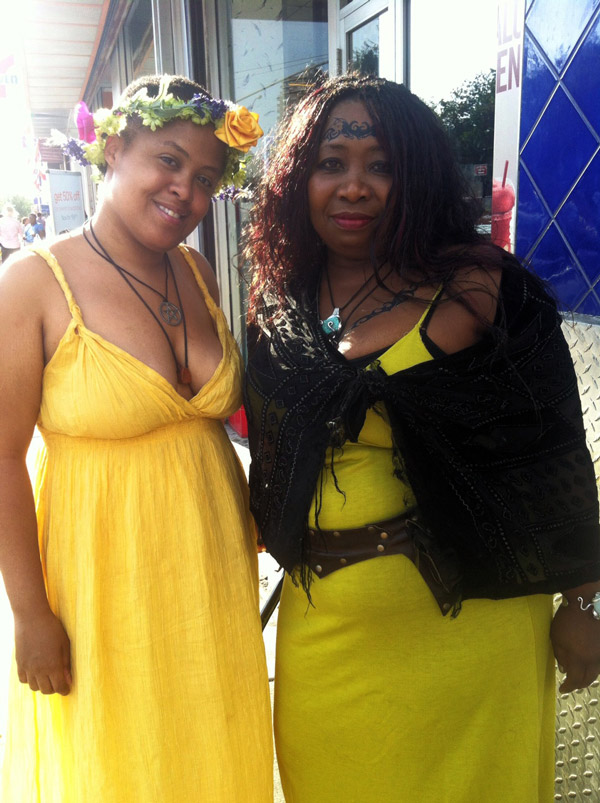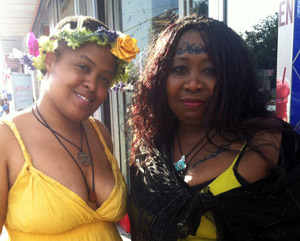BY LAEL HINES | For most people, last Friday was just the first day of summer. But for Star Raven Hawk and Chantal Commons, the day held a much deeper significance.
Practitioners of the Wicca faith, they had agreed to an interview at a Lower East Side Burger King.
Star and Chantal were intricately bedecked in long yellow dresses with floral accessories. Chantal immediately explained they were dressed that way because it was the summer solstice.
“It represents the height of summer,” she said, reverently. “It’s nature at its highest point, everything is flourishing into light. The Earth, the Sun, everything is at its highest potential at this time because the Sun is at its highest point.”
People have many ideas about paganism, many of them false, Star and Chantal said. Chantal gave a concise definition.
“We’re a polytheistic religion,” she explained. “We believe in many goddesses and many gods. Our primary purpose is to celebrate the cycles of the Earth, and celebrate the energies of nature.”
Paganism is a broader term, while Wicca is a distinct subset of paganism.
As for how and why they became pagans, Star and Chantal gave strikingly different answers. Star said she immersed herself in the pagan faith after the death of her husband.
“It became my comfort, it became my means of dealing with his death,” she related. “He was my best friend. If I’m helping other people with my candle spells, each person I help has helped me deal with my grief.”
In contrast, Chantal found that paganism filled her unmet spiritual needs.

Chantal Commons, left, and Star Raven Hawk are proud to be pagans.
“In my family, it was you’re Christian and that’s it,” she explained. “Once I found Wicca, I was more comfortable with it. This was a religion where I was allowed to think for myself, I was allowed to research. For me, it was more logical to be in touch with nature and things I can see and work with rather than just someone out there somewhere. This religion was more tangible for me, so I’ve been studying ever since.”
Chantal described how converts are attracted to the self-empowering elements of paganism.
“We don’t preach this notion that there is some God out there somewhere. A pagan women once said, ‘This is a religion of experience not of belief.’ You are your own priest; there is no one superior to you. It gives people a lot more empowerment to know that you are just as capable to access the higher powers as anyone else.”
Star stressed the nonviolence of paganism.
“It’s one of the few religions that did not kill people to convert them,” she stated. “Wars have been made in the name of Allah or God for centuries. We are one of the few religions that hasn’t done any of that.” This peaceful quality attracts converts toward paganism, she said.
Chantal added that paganism also supports a sense of equality among all people.
“This religion allows people to connect with each other,” she said. “In most religions it’s about the man being above the woman or parents being above the kids in a constant struggle for power. In this religion we can have power with each other. A lot of women flock to this religion because women are honored, respected and treated as equals; it’s like a breath of fresh air. We are open to people of all orientations, all races and all ages. I have a lot of gay friends who come to this religion because other religions condemn them; this religion isn’t about that, it’s about your growth.”
Despite Wicca’s positive aspects, many have misconceptions about it, the pagan pair said.
“A lot of the fear that people have about us is based on mystery,” Star noted.
“It doesn’t help when people spread rumors,” chimed in Chantal. “We don’t worship the devil. We don’t even have the devil. However, people seem to think that, and it sends people away from us.”
To dispel the mystery and ambiguity that steers people away from paganism, the local pagan community is taking steps to standardize the religion and present a clear face to the public.
The first step is the organization of a Pagan Festival on Sat., June 29, on Astor Place.
Star explained, “There are going to be some informational groups so you can learn about our different traditions. We are as central as we can be in Astor Place; it gives us a chance to inform the public about ourselves, it kind of demystifies some of it.”
“We will have live performances, vendors, workshops, just to show the community who we are,” Chantal added.
Another of the street festival’s objectives is to generate funds so the pagans can secure a permanent space, preferably a whole building. The building would be located in the Village, and serve as a “home” for paganism, further standardizing the religion.
“We want to start to have our own space,” Star said passionately. “We just want to have our own space like any other denomination out there. Over the years, Children’s Aid Society has called me and said, ‘We have families who are pagans and they want a place they can go’, but sadly, we don’t have a building.”
Added Chantal, “People in prison might want to reach out to pagan reverends, or people in hospitals might want to reach out to us. Once we get established with a building, we can help them.”
As for why they are focusing their campaign in the Village, Star said, for one, a lot of their members live in the area.
Beyond that, she said, “Honestly, I’ve been all over the city practicing in different places, and I don’t know how to describe it, but there’s something down here. I think it’s always had a spiritual background and you can feel it down here. Even when we’re in the park or the garden or something like that, you feel it.”


































